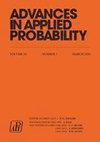半马尔可夫过程中第一通道分布尾展开的指数形式和伽玛形式
IF 1.2
4区 数学
Q3 STATISTICS & PROBABILITY
引用次数: 1
摘要
摘要我们考虑了有限状态半马尔可夫过程(SMPs)在连续和整数时间内的第一次通过分布的生存和密度/质量函数的残差展开。给出了保证这些函数的残差展开式具有主指数/几何项的条件。关键条件假设第一次通过的相关状态包含一个不可约类,从而确保与马尔可夫过程中相位类型分布相同的主指数/几何项。本质上,不可约类的存在以及一些其他条件确保了第一次通过时间分布的矩母函数(MGF)的边界奇异性b是一个简单极点。在连续时间设置中,我们证明了b是主极点,因为MGF在垂线$\{\text{Re}(s)=b\}.$上没有其他极点在整数时间中,我们证明了如果SMP的所有保持时间质量函数都是非周期和非退化的,则b是主导的。展开式和极点表征处理了第一次进入单个新状态或新状态的子集,以及第一次返回到起始状态。数值例子表明,残差展开法比鞍点近似法准确得多,并且可以代替第75百分位以上的精确计算。本文章由计算机程序翻译,如有差异,请以英文原文为准。
Exponential and gamma form for tail expansions of first-passage distributions in semi-markov processes
Abstract We consider residue expansions for survival and density/mass functions of first-passage distributions in finite-state semi-Markov processes (SMPs) in continuous and integer time. Conditions are given which guarantee that the residue expansions for these functions have a dominant exponential/geometric term. The key condition assumes that the relevant states for first passage contain an irreducible class, thus ensuring the same sort of dominant exponential/geometric terms as one gets for phase-type distributions in Markov processes. Essentially, the presence of an irreducible class along with some other conditions ensures that the boundary singularity b for the moment generating function (MGF) of the first-passage-time distribution is a simple pole. In the continuous-time setting we prove that b is a dominant pole, in that the MGF has no other pole on the vertical line
$\{\text{Re}(s)=b\}.$
In integer time we prove that b is dominant if all holding-time mass functions for the SMP are aperiodic and non-degenerate. The expansions and pole characterisations address first passage to a single new state or a subset of new states, and first return to the starting state. Numerical examples demonstrate that the residue expansions are considerably more accurate than saddlepoint approximations and can provide a substitute for exact computation above the 75th percentile.
求助全文
通过发布文献求助,成功后即可免费获取论文全文。
去求助
来源期刊

Advances in Applied Probability
数学-统计学与概率论
CiteScore
2.00
自引率
0.00%
发文量
64
审稿时长
6-12 weeks
期刊介绍:
The Advances in Applied Probability has been published by the Applied Probability Trust for over four decades, and is a companion publication to the Journal of Applied Probability. It contains mathematical and scientific papers of interest to applied probabilists, with emphasis on applications in a broad spectrum of disciplines, including the biosciences, operations research, telecommunications, computer science, engineering, epidemiology, financial mathematics, the physical and social sciences, and any field where stochastic modeling is used.
A submission to Applied Probability represents a submission that may, at the Editor-in-Chief’s discretion, appear in either the Journal of Applied Probability or the Advances in Applied Probability. Typically, shorter papers appear in the Journal, with longer contributions appearing in the Advances.
 求助内容:
求助内容: 应助结果提醒方式:
应助结果提醒方式:


